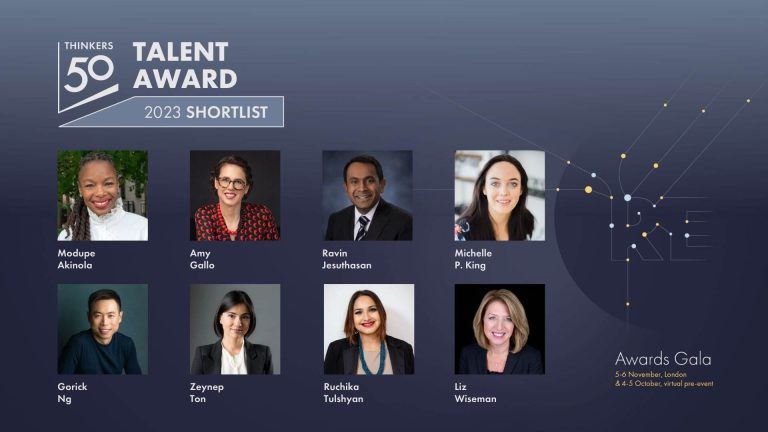

Erica Dhawan is the world’s leading authority on Connectional Intelligence and the founder and CEO of Cotential. She is the co-author of the bestselling book, Get Big Things Done: The Power of Connectional Intelligence. She is one of the speakers at the Thinkers50 European Business Forum in September 2018.
How do you describe yourself?
I am an evangelist, helping people reduce complexity, break silos and work smarter in our digital age.
What is your big idea?
In today’s world, we are not just connected, we are over-connected. But the real challenge that leaders face today is having a lot of networks doesn’t necessarily lead to measurable change. They key is how do you effectively leverage networks to create value. My research and work has led me to develop an idea called connectional intelligence, just as game changing as emotional intelligence was in the 1990s.
Connectional intelligence is the skill that leaders need today to effectively manage and maximise networks and relationships in an over-connected era.
What does that look like in practical terms?
I’ll give you an example from a leading company called Colgate, which is a toothpaste company. A few years ago, a key executive on a team had developed a new fluoride, but there was a mechanical problem and the fluoride was getting stuck in the equipment. It wasn’t meshing well, and all the best chemists internally were trying to figure out why, and no one could, and it was costing hundreds of thousands of dollars.
So, at that point, the executives said, well, why don’t we ask a different network? And they ended up posting this fluoride challenge on a website called InnoCentive. Within three days of posting that challenge, a physicist looked at the problem and he realised this wasn’t a chemistry problem, it was a physics problem. It was about charged particles. You charge the fluoride one way, the toothpaste the other, instantly the problem was solved.
Colgate learned a few things within this experience. The first thing they learned is that they didn’t even dare to ask the physicists at their own company because they had labelled it as a chemistry problem. The physicist with the solution may have never been hired by Colgate because he didn’t have the traditional resume.
So, in today’s world, not only are we connected but when we design better questions to engage broader networks, we can come up with better and breakthrough solutions.
What are you currently working on?
My current research is actually taking connectional intelligence to the next level. I’ve been studying the science of digital communication. As teams become more digitally connected, much of corporate communication is focused on email, WhatsApp, Slack, Snapchat, all of these different tools that we have available.
But what we’ve often lost from these new forms is body language, the human and most natural form of understanding each other and much of digital communication has led to misunderstanding, confusion and frustration in teams. So, my latest research is looking at what I call digital body language and how do you better understand how to relate and interact with others on a solely digital team.
What do you think should be at the top of every CEO’s agenda?
I believe that what should be on the top of every CEO’s agenda is how do we not only respond to technology, but how do we design the right behaviours in our organisations for the future. One of the reasons I believe many transformations fail is because leaders don’t embed the behaviours required to be successful in a digital era. They focus on technology or the next tool that they need instead of the human behaviours required of their leaders to really transform a company.
What do you think should be the big issue for the next decade?
I think that the big issue is as we move to become more digital in our workplaces, how do we stay human? How do we ensure that we’re building the skills and empathy of creativity, of human connection, in a world that will become more and more virtually connected? And I believe that that is really about embedding the leadership skill sets beyond new technologies and tools.
What insights from your work will have the greatest relevance for the Fourth Industrial Revolution and why?
Much of the conversation has really been about how do we collaborate in better and smarter ways? How do we break down silos and work across teams, business units, with our customers differently? And my work really focuses on how do we not only collaborate, but how do we design better questions to ensure we’re engaging broader networks?
So, in the Colgate example the key insight was not just about crowd sourcing and asking different groups, it was about designing questions differently, so that we’re ensuring that we’re finding and discovering the new experts that maybe on the frontlines of our workforce, or maybe a customer who has used the product many times before. And it’s that design challenge that I believe is the critical skill for leaders today.
What is the most important question you ask in your work as a thinker and as a leader?
The real question that I ask myself is, am I asking the right questions? Am I including the right people in discovering the answers?
Because I believe today the real game changer is not access to data or metrics, it’s access to the right questions that lead to breakthrough solutions.
What does Thinkers50 mean to you?
Thinkers50 means creating enabling platforms for ideas to be shared and spread.

Thinkers50 Limited
The Studio
Highfield Lane
Wargrave RG10 8PZ
United Kingdom

Thinkers50 Limited
The Studio
Highfield Lane
Wargrave RG10 8PZ
United Kingdom

| Cookie | Duration | Description |
|---|---|---|
| LANG | 9 hours | Linkedin set this cookie to set user's preferred language. |
| nsid | session | This cookie is set by the provider PayPal to enable the PayPal payment service in the website. |
| sp_landing | 1 day | The sp_landing is set by Spotify to implement audio content from Spotify on the website and also registers information on user interaction related to the audio content. |
| sp_t | 1 year | The sp_t cookie is set by Spotify to implement audio content from Spotify on the website and also registers information on user interaction related to the audio content. |
| tsrce | 3 days | PayPal sets this cookie to enable the PayPal payment service in the website. |
| x-pp-s | session | PayPal sets this cookie to process payments on the site. |
| __cf_bm | 30 minutes | This cookie, set by Cloudflare, is used to support Cloudflare Bot Management. |
| Cookie | Duration | Description |
|---|---|---|
| l7_az | 30 minutes | This cookie is necessary for the PayPal login-function on the website. |
| Cookie | Duration | Description |
|---|---|---|
| CONSENT | 2 years | YouTube sets this cookie via embedded youtube-videos and registers anonymous statistical data. |
| _ga | 2 years | The _ga cookie, installed by Google Analytics, calculates visitor, session and campaign data and also keeps track of site usage for the site's analytics report. The cookie stores information anonymously and assigns a randomly generated number to recognize unique visitors. |
| _gat_gtag_UA_10408481_1 | 1 minute | Set by Google to distinguish users. |
| _ga_ZP8HQ8RZXS | 2 years | This cookie is installed by Google Analytics. |
| _gid | 1 day | Installed by Google Analytics, _gid cookie stores information on how visitors use a website, while also creating an analytics report of the website's performance. Some of the data that are collected include the number of visitors, their source, and the pages they visit anonymously. |
| Cookie | Duration | Description |
|---|---|---|
| NID | 6 months | NID cookie, set by Google, is used for advertising purposes; to limit the number of times the user sees an ad, to mute unwanted ads, and to measure the effectiveness of ads. |
| test_cookie | 15 minutes | The test_cookie is set by doubleclick.net and is used to determine if the user's browser supports cookies. |
| VISITOR_INFO1_LIVE | 5 months 27 days | A cookie set by YouTube to measure bandwidth that determines whether the user gets the new or old player interface. |
| YSC | session | YSC cookie is set by Youtube and is used to track the views of embedded videos on Youtube pages. |
| yt-remote-connected-devices | never | YouTube sets this cookie to store the video preferences of the user using embedded YouTube video. |
| yt-remote-device-id | never | YouTube sets this cookie to store the video preferences of the user using embedded YouTube video. |
| yt.innertube::nextId | never | This cookie, set by YouTube, registers a unique ID to store data on what videos from YouTube the user has seen. |
| yt.innertube::requests | never | This cookie, set by YouTube, registers a unique ID to store data on what videos from YouTube the user has seen. |
| Cookie | Duration | Description |
|---|---|---|
| DEVICE_INFO | 5 months 27 days | No description |
| loglevel | never | No description available. |
| m | 2 years | No description available. |
Thinkers50 Limited has updated its Privacy Policy on 28 March 2024 with several amendments and additions to the previous version, to fully incorporate to the text information required by current applicable date protection regulation. Processing of the personal data of Thinkers50’s customers, potential customers and other stakeholders has not been changed essentially, but the texts have been clarified and amended to give more detailed information of the processing activities.